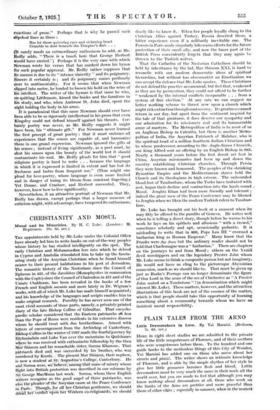CARDINAL AND POET
IF Newman had written nothing but his Apologia, he would have been remembered as the author of one of the world's most searching, most sensitive autobiOgraphiis. The writing of it, as Mr. Reilly says, was for him ,a via dolorosa. Super- sensitive as he was, and self-centred, the writing-up of those memories that lay too deep for tears was almost more than he could endure. "Often unable to sleep or eat, he continued at his task sheerly by force of will, working at his high desk on one occasion for twenty-three hours without intermission, while his tears stained the sheets on .which he wrote." To find another confession so revealing, so musical, and so tender as the Apologia, one must go to St. Augustine himself.
But Newman also wrote novels, - controversial pamphlets, sermons, a book on higher education, and histories. He also wrote poems. It is part of the inexorable irony of things that by his poetry, rather than .hy,1*.. Apologia or his Idea of a University, the world prefers to remember him. From one at least of his poems even the most illiterate could quote : "Lead, Kindly Light " is possibly still the most popular of all English hymns.
In one of his letters, Newman writes banteringly of compos- ing poems whilst he is shaving. "He turned to verse," says Mr. Reilly, " as a literary relaxation from the relentless
actions of prose." Perhaps that is Why he passed such" slipshod lines as these : Nor let these quivering eyes and sickening heart Crumble to dust beneath the Tempter's dart . . •
(ft surely needs an extraordinary enthusiasm to add, as Mr.- Reilly adds, "There is a touch here that George Herbert' 'Would have envied.") Perhaps it is the very ease with which' Newman wrote his verses that has marked down his hymn tor such popular approval. Mr. ReillY rather supposes that its success is due to its " intense Sineerity " and its poignancy. Sincere it certainly is ; and ifs poignancy Conies perilously it= to sentimentality. For it seems that when Newman slipped into metre, he tended to loosen his hold On the reins of his intellect. The writer of the hymns is that Same he who,- Oil quitting Littlemore, kissed the bobks and the furniture in' his study, and who, when Ambrose St. John died, spent the night holding the body in his arms.
It is paradoxical that this same Newman should ever have been able to be so rigorously intellectual in his prose that even' Kingsley could not defend himself against his thrusts. Cer-' Vainly poetry was never, as Mr. Reilly suggests it might have been, his "ultimate gift." For Newman never learned- the first precept of great poetry : that it must embrace all experiences that the senses are capable of, and harmonize" them in one grand expression. Newman ignored the gifts of his senses ; instead of living significantly, as a poet must, he' shut his senses upon the beauty of the world lest it should contaminate his soul. Mr. Reilly pleads for him that "good religious poetry is hard to write . . . because the language-
in which it is expressed is limited in extent and has lost its freshness and lustre from frequent use." (Thus might one plead for love-poetry, whose language is even more limited and in danger of losing its bloom from constant fingering.) Yet Donne, and Crashaw, and Herbert succeeded. They, however, knew how to live significantly.
Nevertheless, it an attractive portrait of Newman that Mr. Reilly has drawn, except perhaps that a larger measure of criticism might, with advantage, have tempered its enthusiasm.-



























































 Previous page
Previous page